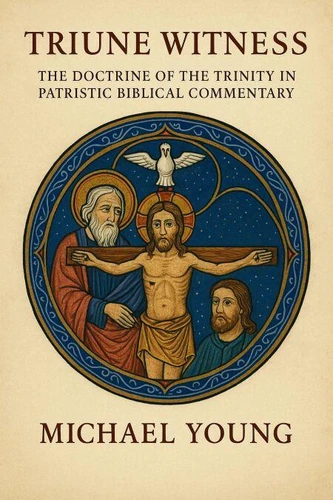Triune Witness: The Doctrine of the Trinity in Patristic Biblical Commentary
Par :Formats :
Disponible dans votre compte client Decitre ou Furet du Nord dès validation de votre commande. Le format ePub est :
- Compatible avec une lecture sur My Vivlio (smartphone, tablette, ordinateur)
- Compatible avec une lecture sur liseuses Vivlio
- Pour les liseuses autres que Vivlio, vous devez utiliser le logiciel Adobe Digital Edition. Non compatible avec la lecture sur les liseuses Kindle, Remarkable et Sony
 , qui est-ce ?
, qui est-ce ?Notre partenaire de plateforme de lecture numérique où vous retrouverez l'ensemble de vos ebooks gratuitement
Pour en savoir plus sur nos ebooks, consultez notre aide en ligne ici
- FormatePub
- ISBN8230039754
- EAN9798230039754
- Date de parution15/04/2025
- Protection num.pas de protection
- Infos supplémentairesepub
- ÉditeurIndependently Published
Résumé
"Triune Witness: The Doctrine of the Trinity in Patristic Biblical Commentary" explores the foundational theological reflections of the early Church Fathers on the doctrine of the Trinity as revealed through their biblical commentaries. In this scholarly work, Michael Young traces the development of Trinitarian thought from the Apostolic Fathers through to the fourth and fifth centuries, focusing on how key figures like Irenaeus, Tertullian, Athanasius, the Cappadocian Fathers, and Augustine engaged with Scripture to articulate the relationship between the Father, Son, and Holy Spirit.
Drawing upon an extensive analysis of their exegesis, this book offers a detailed examination of how early Christian theologians approached the seemingly paradoxical task of maintaining both the unity of God and the distinct persons within the Godhead. Through their biblical commentary, these Fathers wrestled with complex theological questions, developing key doctrines that would shape Christian orthodoxy for centuries to come."Triune Witness" also highlights the dynamic relationship between theology and the Bible in the patristic period, showing how biblical texts were interpreted to reveal the mystery of God's triune nature.
Young demonstrates that, beyond their intellectual significance, these commentaries also served pastoral and liturgical purposes, helping the early Church to form a coherent understanding of the Trinity that could be proclaimed in worship and lived out in Christian community. This work is essential for scholars of early Christianity, systematic theology, and biblical studies, offering fresh insights into how the doctrine of the Trinity was shaped by patristic thinkers and how their interpretations of Scripture continue to influence Christian theology today.
Drawing upon an extensive analysis of their exegesis, this book offers a detailed examination of how early Christian theologians approached the seemingly paradoxical task of maintaining both the unity of God and the distinct persons within the Godhead. Through their biblical commentary, these Fathers wrestled with complex theological questions, developing key doctrines that would shape Christian orthodoxy for centuries to come."Triune Witness" also highlights the dynamic relationship between theology and the Bible in the patristic period, showing how biblical texts were interpreted to reveal the mystery of God's triune nature.
Young demonstrates that, beyond their intellectual significance, these commentaries also served pastoral and liturgical purposes, helping the early Church to form a coherent understanding of the Trinity that could be proclaimed in worship and lived out in Christian community. This work is essential for scholars of early Christianity, systematic theology, and biblical studies, offering fresh insights into how the doctrine of the Trinity was shaped by patristic thinkers and how their interpretations of Scripture continue to influence Christian theology today.
"Triune Witness: The Doctrine of the Trinity in Patristic Biblical Commentary" explores the foundational theological reflections of the early Church Fathers on the doctrine of the Trinity as revealed through their biblical commentaries. In this scholarly work, Michael Young traces the development of Trinitarian thought from the Apostolic Fathers through to the fourth and fifth centuries, focusing on how key figures like Irenaeus, Tertullian, Athanasius, the Cappadocian Fathers, and Augustine engaged with Scripture to articulate the relationship between the Father, Son, and Holy Spirit.
Drawing upon an extensive analysis of their exegesis, this book offers a detailed examination of how early Christian theologians approached the seemingly paradoxical task of maintaining both the unity of God and the distinct persons within the Godhead. Through their biblical commentary, these Fathers wrestled with complex theological questions, developing key doctrines that would shape Christian orthodoxy for centuries to come."Triune Witness" also highlights the dynamic relationship between theology and the Bible in the patristic period, showing how biblical texts were interpreted to reveal the mystery of God's triune nature.
Young demonstrates that, beyond their intellectual significance, these commentaries also served pastoral and liturgical purposes, helping the early Church to form a coherent understanding of the Trinity that could be proclaimed in worship and lived out in Christian community. This work is essential for scholars of early Christianity, systematic theology, and biblical studies, offering fresh insights into how the doctrine of the Trinity was shaped by patristic thinkers and how their interpretations of Scripture continue to influence Christian theology today.
Drawing upon an extensive analysis of their exegesis, this book offers a detailed examination of how early Christian theologians approached the seemingly paradoxical task of maintaining both the unity of God and the distinct persons within the Godhead. Through their biblical commentary, these Fathers wrestled with complex theological questions, developing key doctrines that would shape Christian orthodoxy for centuries to come."Triune Witness" also highlights the dynamic relationship between theology and the Bible in the patristic period, showing how biblical texts were interpreted to reveal the mystery of God's triune nature.
Young demonstrates that, beyond their intellectual significance, these commentaries also served pastoral and liturgical purposes, helping the early Church to form a coherent understanding of the Trinity that could be proclaimed in worship and lived out in Christian community. This work is essential for scholars of early Christianity, systematic theology, and biblical studies, offering fresh insights into how the doctrine of the Trinity was shaped by patristic thinkers and how their interpretations of Scripture continue to influence Christian theology today.






















